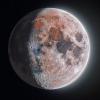NASA’s Midas Touch: Parker Probe Touching The Sun
In Greek mythology, Icarus was the son of an architect called Daedalus. They wanted to escape from the island of Crete since the king had imprisoned them for sharing their secrets. Daedalus had constructed wings from birds’ moulted feathers and some other materials. He had used the beeswax for the ‘construction’ of the wings. Daedalus had warned his son that he should not fly too high. But Icarus became overambitious and flew too close to the Sun. The heat melted the wax in his wings, and he drowned in the sea.








